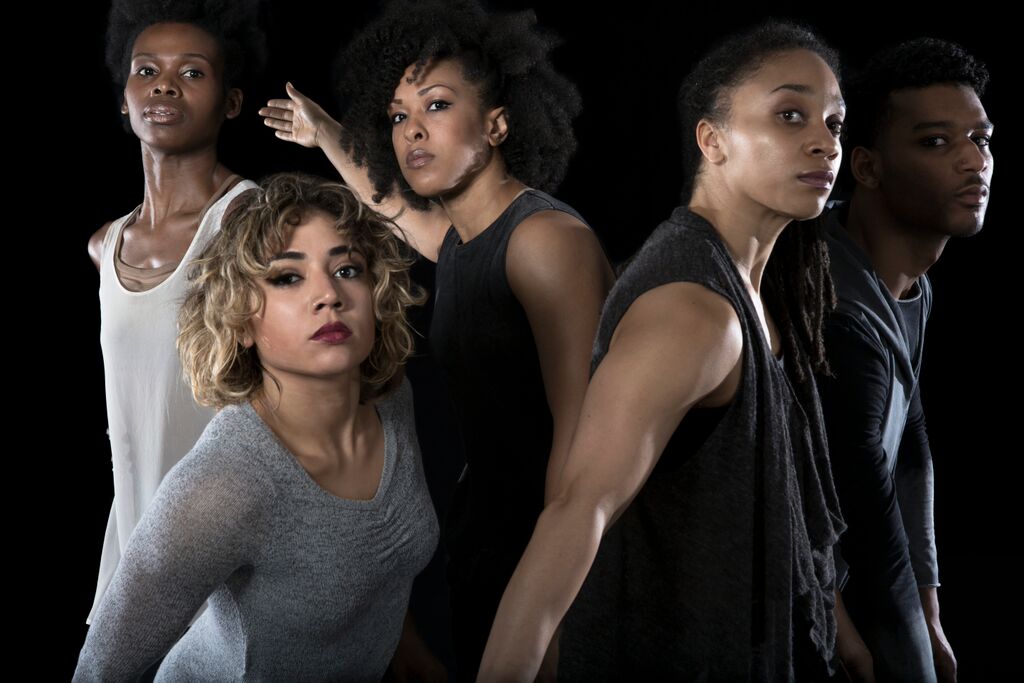CHICAGO — Jazz music and contemporary dance: misunderstood genres which often operate ahead of their time. It isn’t until years, or even decades later that audiences accept and begin to appreciate art forms that look and sound strange at first. Such was the case with John Coltrane (1926-1967), a legendary saxophonist and composer who quite literally changed jazz music. Perhaps the same might be said of Jawole Willa Jo Zollar, whose influence has radiated throughout the dance community for more than 30 years.
Coltrane’s intricate scores leave plenty of breathing room in which to play, and Zollar’s work inspired by Coltrane’s iconic A Love Supreme seems to follow the same approach (if you aren’t familiar with John Coltrane, check out this great primer on NPR).
Chanon Judson enters alone in the dark, her white frock radiating through the exit sign glow at the Dance Center of Columbia College Chicago. As light peeks onstage from the wings, we begin to see the lanky Judson’s fluid pelvis pulse side to side. Her focus is inward as though channeling Coltrane – a duet with his ghost, perhaps. As the others enter they take a similar tack, each drawing nuances out of Philip White’s original score in a long series of simultaneous solos. This is “Side A” of the two part evening, which feels like an evolution of A Love Supreme, while “Side B” is the embodiment of it (including live piano accompaniment by George Caldwell). As with any great jazz ensemble, it is difficult to tell when Zollar’s choreography stops and improvisation takes over, and that is Walking with ‘Trane’s magnificence.
In 2014, the year Zollar began her work on Walking with ‘Trane, A Love Supreme was celebrating 50 years of existence. The music was created by mixing and mashing rhythms, transcending genre and etymology, using these multiplicities to create something entirely new. Zollar approaches dance in a similar way, melding female-centered movement traditions from the African diaspora with western concert dance. Though her dances read today as palatable – there is little outside the norm here – Urban Bush Women must have been perceived as quite radical in its infancy, as Coltrane’s music was in the late 1950’s and early 1960’s at the pinnacle of his career.
Urban Bush Women has a long history with the Dance Center of Columbia College Chicago, and last weekend’s appearance marked the company’s second tour there in as many years. One of the goals in creating Walking with ‘Trane was to invite jazz audiences to engage with dance. Walking with ‘Trane seems an ideal work for the intimate space, bringing potentially new viewers very close to very good dance. Maybe today’s jazz audiences struggle with the problems faced by other art forms that didn’t grow up in a theater. Jazz has an air of sophistication that has taken it to Carnegie Hall, yet it feels most at home in a seedy night club in Kansas City, with smoke in the air and table talk in your ears.
This might be one of the more distinct differences between concert dance and jazz music – jazz gives permission to let the listener fade in and out of attention, to let the music wash over us, or to offer unbridled enthusiasm after a compelling solo. The formality of the traditional proscenium at the Dance Center, however, made me feel a bit stodgy and removed from my gutteral reactions to this work (particularly in a glorious scat solo performed by Tendayi Kuumba). I wanted to audibly “hmm,” or talk to my neighbor, or even shout a “yes!” here and there. The ability of these dancers to draw you into their worlds made it honestly hard to hold back. At the end of the piece, the dancers face upstage, staring at a quote in Coltrane’s handwriting: “Rising hormones to a level of blissful stability at end.” This encapsulates the warm feeling Walking with ‘Trane leaves in your belly.
The more I sit with this work, the more I love it. Like Coltrane’s music, however, it’s hard to identify why exactly it’s so good. Oscar Wilde wrote, “Books are well written, or badly written. That is all.” Perhaps Walking with ‘Trane, like A Love Supreme, is supremely well written, and that is all, or perhaps Wilde is wrong and it’s something more than that. Who knows.
